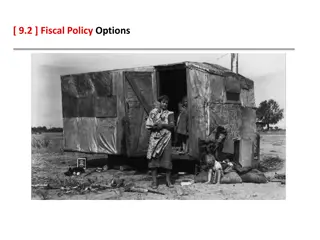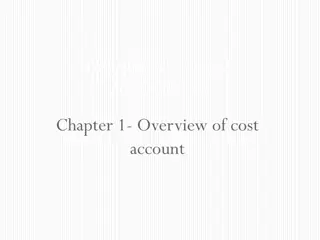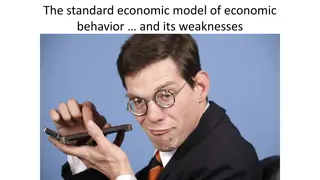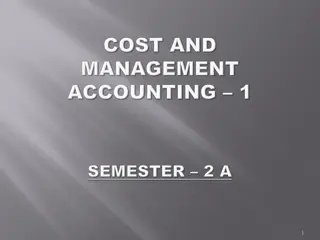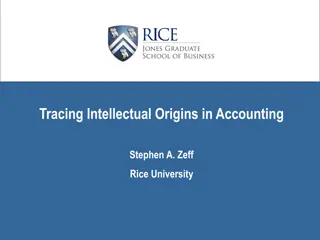Insights into Mental Accounting and Self-Control in Behavioral Economics
Herbert Simon and Richard Thaler are pioneers in behavioral economics, emphasizing the human tendency to seek satisfactory rather than optimal solutions. Mental accounting involves categorizing expenses into different accounts, limiting the fungibility of money. Thaler's example of Gene Hackman and Dustin Hoffman showcases how mental accounting can enable self-control by mitigating impulsive spending. Separate accounts act as commitment devices against overspending, especially on non-essential items.
Download Presentation

Please find below an Image/Link to download the presentation.
The content on the website is provided AS IS for your information and personal use only. It may not be sold, licensed, or shared on other websites without obtaining consent from the author.If you encounter any issues during the download, it is possible that the publisher has removed the file from their server.
You are allowed to download the files provided on this website for personal or commercial use, subject to the condition that they are used lawfully. All files are the property of their respective owners.
The content on the website is provided AS IS for your information and personal use only. It may not be sold, licensed, or shared on other websites without obtaining consent from the author.
E N D
Presentation Transcript
Mental Accounting Behavioral Economics Udayan Roy
Herbert Simon: A Behavioral Economics Pioneer Herbert Simon argued that, rather than finding optimal solutions that maximize lifetime expected utility, decision- makers typically try to find acceptable solutions to acute problems. The very difficult problem of finding an optimum is thus replaced by the simpler problem of satisfying a set of self- imposed constraints.
Richard Thaler: A Behavioral Economics Pioneer Thaler (1980) was the first economist to apply prospect theory to economic issues and problems. While Kahneman and Tversky (1979) had focused on risky decisions, Thaler showed the importance of reference points and loss aversion in deterministic settings.
Mental Accounts and the Fungibility of Money People group their expenditures into different categories (housing, food, clothes, etc.), with each category corresponding to a separate mental account. Each mental account has its own budget. This results in limited fungibility of money between the accounts. Video: https://youtu.be/t96LNX6tk0U
Mental Accounts and the Fungibility of Money To illustrate mental accounting, Thaler and Sunstein (2008, pp. 53-54) use an incident involving the actors Gene Hackman and Dustin Hoffman: Hackman and Hoffman were friends back in their starving artist days, and Hackman tells the story of visiting Hoffman s apartment and having his host ask him for a loan. Hackman agreed to the loan, but then they went into Hoffman s kitchen, where several mason jars were lined up on the counter, each containing money. One jar was labelled rent, another utilities, and so forth. Hackman asked why, if Hoffman had so much money in jars, he could possibly need a loan, whereupon Hoffman pointed to the food jar, which was empty.
Mental Accounting May Enable Self Control The Hackman-Hoffman example illustrates the idea that mental- accounting strategies may mitigate self-control problems. In other words, one irrationality (mental accounting) may reduce the harm from another irrationality (impatience). Thaler (1985) suggests that the practice of maintaining separate accounts for different spending categories also provides a commitment device against overspending, especially for non-essential or addictive goods.
Mental Accounts Simplify Decision Making Thaler argues that mental accounts are used more generally as a way for boundedly rational individuals to simplify their financial decision- making.
Mental Accounts Ignore the Fungibility of Money Two groups were asked whether they would be willing to buy a ticket to see a play on the weekend. Group A: Imagine you spent $50 earlier in the week to go to a basketball game Group B: Imagine you received a $50 parking ticket earlier in the week Would we observe the two groups answers to be similar?
Mental Accounts Ignore the Fungibility of Money Two groups were asked whether they would be willing to buy a ticket to see a play on the weekend. Group A: Imagine you spent $50 earlier in the week to go to a basketball game Group B: Imagine you received a $50 parking ticket earlier in the week Group A was significantly less willing to see the play.
Mental Accounts Ignore the Fungibility of Money Two groups were asked whether they would be willing to buy a ticket to see a play on the weekend. Group A: Imagine you spent $50 earlier in the week to go to a basketball game Group B: Imagine you received a $50 parking ticket earlier in the week Group A was significantly less willing to see the play. Standard Econ: This makes no sense!
Mental Accounts Ignore the Fungibility of Money Two groups were asked whether they would be willing to buy a ticket to see a play on the weekend. Group A: Imagine you spent $50 earlier in the week to go to a basketball game Group B: Imagine you received a $50 parking ticket earlier in the week Group A was significantly less willing to see the play. Mental Accounting: People have an entertainment account. They didn t want to exceed their budget for that account.
A Classic Example Problem A: You have paid $10 for a ticket to a play. As you get to the theater you discover that you have lost the $10 ticket. Would you buy another ticket for $10? Problem B: You have decided to see a play for $10. As you get to the theater you discover that you have lost a $10 bill. Would you still buy a ticket for $10?
A Classic Example Problem A: You have paid $10 for a ticket to a play. As you get to the theater you discover that you have lost the $10 ticket. Would you buy another ticket for $10? Yes 46%; No 54% Problem B: You have decided to see a play for $10. As you get to the theater you discover that you have lost a $10 bill. Would you still buy a ticket for $10? Yes 88%; No 12%
A Classic Example Problem A: You have paid $10 for a ticket to a play. As you get to the theater you discover that you have lost the $10 ticket. Would you buy another ticket for $10? Yes 46%; No 54%. Problem B: You have decided to see a play for $10. As you get to the theater you discover that you have lost a $10 bill. Would you still buy a ticket for $10? Yes 88%; No 12% Standard Econ: This makes no sense!
A Classic Example Problem A: You have paid $10 for a ticket to a play. As you get to the theater you discover that you have lost the $10 ticket. Would you buy another ticket for $10? Yes 46%; No 54%. Problem B: You have decided to see a play for $10. As you get to the theater you discover that you have lost a $10 bill. Would you still buy a ticket for $10? Yes 88%; No 12% Mental Accounting: The lost $10 bill is in a separate account.
A Classic Example Going to the theater is normally viewed as a transaction in which the cost of the ticket is exchanged for the experience of seeing the play. Buying a second ticket increases the cost of seeing the play to a level that many respondents apparently find unacceptable. In contrast, the loss of the cash is not posted to the account of the play, and it affects the purchase of a ticket only by making the individual feel slightly less affluent. Choices, Values, and Frames, by Daniel Kahneman and Amos Tversky, American Psychologist, vol. 34, 1984. Reprinted in Thinking, Fast and Slow by Daniel Kahneman, Appendix B.
A Classic Example A twist: Both problems were presented to every subject. For one group the lost ticket problem came first. For the other group the lost cash problem came first. When the lost cash problem was presented before the lost ticket problem, the willingness to buy a second ticket after losing a ticket increased significantly. The juxtaposition of the two problems apparently enabled the subjects to realize that it makes sense to think of the lost ticket as lost cash, but not vice versa.
Jacket-Calculator Mental Accounts Imagine you are about to purchase a jacket for $125 and a calculator for $15. Problem A: The calculator salesman tells you that the calculator is on sale for $10 at the other branch of the store, a 20-minute drive away. Would you go to the other store to save $5? Problem B: The jacket salesman tells you that the jacket is on sale for $120 at the other branch of the store, a 20-minute drive away. Would you go to the other store to save $5?
Jacket-Calculator Mental Accounts 68% of those in the study said they would drive 20 minutes to save $5 on the $15 calculator but only 29% were willing to make the same trip to save $5 on the $125 jacket Standard Econ: This makes no sense! Mental Accounting: The jacket purchase and the calculator purchase may be happening at the same time but they are in different mental accounts. The $5 saving means different things in the two accounts.
Jacket-Calculator Mental Accounts The idea behind the jacket-v-calculator example has also been found for identical products sold in different shops the standard deviation of prices that different stores in a city quote for the same product is roughly proportional to the average price of that product. Thinking, Fast and Slow by Daniel Kahneman, page 443
Regular and Premium Gasoline Hastings and Shapiro (2013) provide evidence for a key aspect of mental accounting: the lack of fungibility of money. They studied the choice between regular and premium gasoline when the price of gasoline fell by about 50% in 2008 and found that the shift from regular gasoline to premium gasoline was 14 times greater than predicted by a standard demand model. Mental accounting with a specific account for gasoline and a specific budget for that account explains this excessive shift. Interestingly, and also predicted by mental accounting, they found no similar shifts from lower to higher quality products in other product categories for which prices had not changed.
Disposition Effect Investors will tend to hold on to losing stocks, because selling implies closing the account and experiencing the loss. Shefrin and Statman (1985) provided the first empirical evidence for this effect, which they labeled the disposition effect. The disposition effect was confirmed by Odean (1998), using a large dataset from a discount brokerage firm.
Disposition Effect These findings indicate that people keep separate accounts for each asset they buy. Selling an asset that has fallen in price would mean closing that particular account and acknowledging that account was a loss. If losses and gains are evaluated and experienced only when a mental account is closed, investors will more likely sell stocks that have increased in value than stocks that have decreased in value.
Sunk Costs Fallacy Consider the following scenario from Thinking, Fast and Slow by Daniel Kahneman, page 343: Two equally avid sports fans plan to travel 40 miles to see a basketball game. One of them paid for his ticket; the other was on his way to purchase a ticket when he got one free from a friend. A blizzard is announced for the night of the game. Which of the two ticket holders is more likely to brave the blizzard to see the game?
Sunk Costs Fallacy Consider the following scenario from Thinking, Fast and Slow by Daniel Kahneman, page 343: Two equally avid sports fans plan to travel 40 miles to see a basketball game. One of them paid for his ticket; the other was on his way to purchase a ticket when he got one free from a friend. A blizzard is announced for the night of the game. Which of the two ticket holders is more likely to brave the blizzard to see the game? Most people: The fan who has already paid. Standard economics: Nope. The payment is a sunk cost. A sunk cost should never affect decisions.
Sunk-Cost Fallacy Mental accounting provides the explanation. We assume that both fans set up mental accounts for the game they hoped to see. Regardless of how they came by their ticket, both will be disappointed but the closing balance is distinctively more negative for the one who bought a ticket and is now out of pocket as well as deprived of the game. The decision to invest additional resources in a losing account, when better investments are available, is known as the sunk-cost fallacy Driving into the blizzard because one paid for tickets is a sunk-cost error.
Sunk-Cost Fallacy: Implications Long-term gym memberships and exercise behavior Entanglement in wars: Vietnam, Iraq, Afghanistan, Annual fees for Costco, Amazon Prime,
Sunk-Cost Fallacy: Silver Lining? On the other hand, mental accounting and this fallacy may be a way to force ourselves to look before we leap and help us avoid doing things that may end up costing us in the end.
Cab Drivers in New York City In a well-known study, Thaler and co-authors studied labor-supply decisions of taxi drivers in New York City (Camerer et al. 1997). They found evidence for reference dependent preferences and narrow bracketing in the sense that drivers behave as if they try to attain a target income (the reference point) every day and thereby suffer from loss aversion if they fail to reach the target. In other words, each working day seems to correspond to a separate mental account. Drivers therefore drive less on days with high demand and more on days with low demand, which is the opposite of what standard economic theory would predict.
House-Money Effect Thaler and Johnson (1990) showed that even though individuals tend to be risk averse, they often become risk-seeking with money recently gained in, for instance, gambling. This house-money effect occurs because the gains are put into a special mental account, which is treated differently from other money. An implication of the house-money effect is that one might see riskier behavior in asset markets after a period of rising prices
Break-Even Effect Thaler and Johnson (1990) also find evidence for a break-even effect : an extra tendency for risk-seeking behavior in the loss domain when there is a chance to break even from a previous loss.
Mental Accounting in Saving Behavior In one study, the typical household had more that $5,000 in liquid assets in low-interest savings accounts and at the same time owed nearly $3,000 in very high-interest credit card balances Standard Econ: This makes no sense! Mental Accounting: People have different mental accounts for credit card transactions and their savings accounts. They don t want to take money from the sacred savings account. They d rather pay for stuff with borrowed money by using their credit cards even it means paying high interest rates.
Mental Accounting in Saving Behavior And don t scoff; this weird-looking behavior may actually be helping people avoid going even deeper into debt. People often borrow on their credit cards to their maximum credit limit If they instead took money out of their savings accounts to pay for stuff they might lose their savings account savings and keep borrowing on their credit cards to their credit limits. Mental accounting may be helping with self-control problems.
Sources RICHARD H. THALER: INTEGRATING ECONOMICS WITH PSYCHOLOGY Scientific Background on the Sveriges Riksbank Prize in Economic Sciences in Memory of Alfred Nobel 2017 By The Committee for the Prize in Economic Sciences in Memory of Alfred Nobel, October 9, 2017 Misbehaving by Richard Thaler, Chapters 7-9 Thinking, Fast and Slow by Daniel Kahneman, Chapter 32 Nudge by Richard Thaler and Cass Sunstein, Chapter 2










